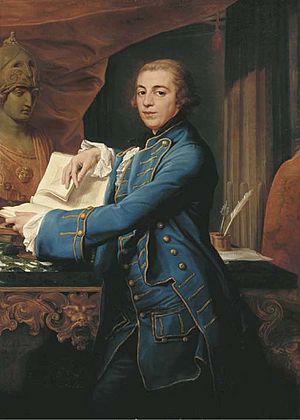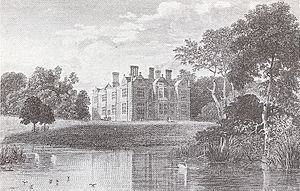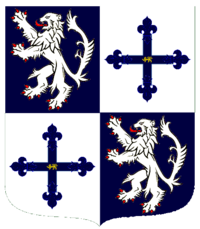John Crewe, 1st Baron Crewe facts for kids
John Crewe, 1st Baron Crewe (born September 27, 1742 – died April 28, 1829) was an important British politician. He lived at Crewe Hall in Cheshire, England. People mostly remember him for helping to create a special law in 1782. This law stopped customs officers and post office workers from voting in elections.
Contents
Early Life and Family
John Crewe was the oldest son in his family. His father, also named John Crewe, was a Member of Parliament (MP) for Cheshire. An MP is someone elected to represent people in the country's government. His grandfather, John Offley Crewe, was also an MP for the same area.
When his father passed away in 1752, John Crewe inherited Crewe Hall. This was his family's large home.
Starting in Politics
In 1764, John Crewe became the High Sheriff of Cheshire. This was an important local job. The next year, in 1765, he became an MP himself. He joined the Whig party and represented the area of Stafford.
In 1768, he was elected to represent Cheshire. He held this job for 34 years! He was never challenged for the seat, which shows people in Cheshire really liked him. He was known as a good farmer and a fair landlord.
Working in Parliament
John Crewe was a strong supporter of another important politician named Charles James Fox. He even helped Fox with money. Later, when Fox was out of power, he wanted to give Crewe a special title called a "peerage." A peerage would make Crewe a "Baron" and give him a seat in the House of Lords.
Crewe stayed loyal to Fox. Finally, in 1806, four years after he left the House of Commons, he got his wish. He was made Baron Crewe of Crewe. This was a big honor.
Crewe's Important Act
John Crewe didn't speak much in the House of Commons. But he was very focused on one important law. This law became known as Crewe's Act of 1782.
The law tried to stop a problem in elections. Back then, some towns, called "rotten boroughs," had very few voters. It was easy for powerful people to control these elections. They would offer good jobs to voters or their families in exchange for their votes. This was a type of corruption.
The Prime Minister at the time said that about 11,500 customs and tax officers could vote. He also said that these votes decided about 70 seats in the House of Commons.
Crewe wanted to stop this. He introduced a bill in 1780 and again in 1781. In 1781, his bill finally became law. It stopped customs and post office workers from voting. However, people found ways around the law. They simply offered jobs to the voters' relatives instead!
His Family and Later Life
In 1766, John Crewe married Frances Anne Greville. They had two children who lived to be adults:
- John, who took over his father's title later.
- Elizabeth Emma Crewe.
Lord Crewe passed away in 1829. His wife, often called "Mrs. Crewe," was famous for hosting political parties. She died in 1818.
|
 | Emma Amos |
 | Edward Mitchell Bannister |
 | Larry D. Alexander |
 | Ernie Barnes |





